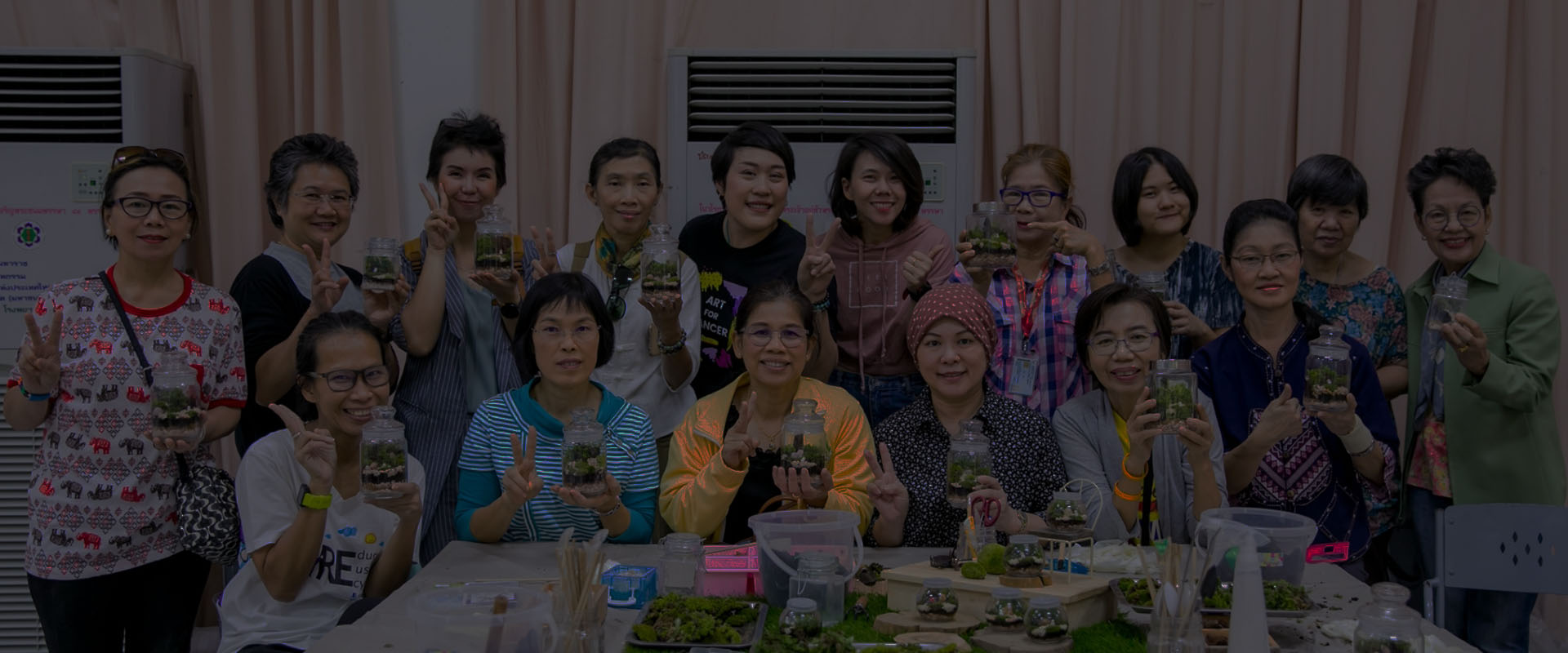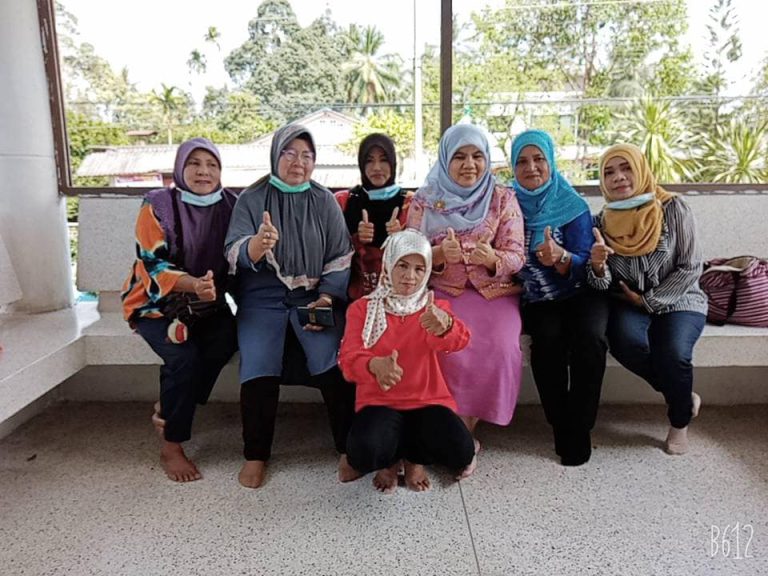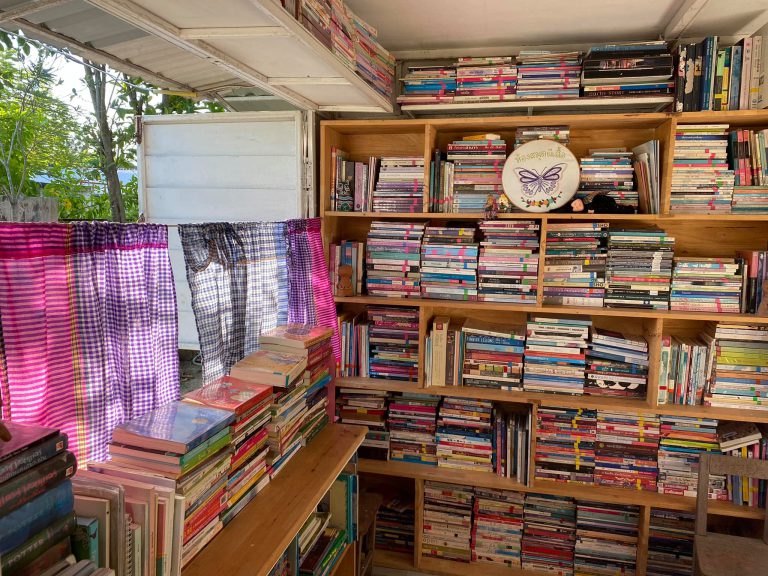Story: Sarinthorn Ratjaroenkhajorn
A 26 year old graduate of Silpakorn University was preparing to go to graduate school. A taekwondo champion with many titles under her belt, she was healthy, successful and marching forward on the life-path that she had planned out. Then, as she was in the midst of meeting all her friends for the last time before going away to study in England, she was diagnosed with breast cancer. Needless to say, it was completely unexpected, and she went into denial. Her life plans fell apart. She couldn’t understand it, and “cried for four days straight”, but even so, it must be said that “Ireal Traisansri” or “Oy” accepted her new reality swiftly, and started her prescribed course of treatment.
It was during chemotherapy that Ireal observed the suffering of her “companions in cancer” and decided to help them. So, “Art for Cancer by Ireal”, an arts non-profit that raises funds for poor cancer patients, and its corresponding facebook page, was created in 2011.
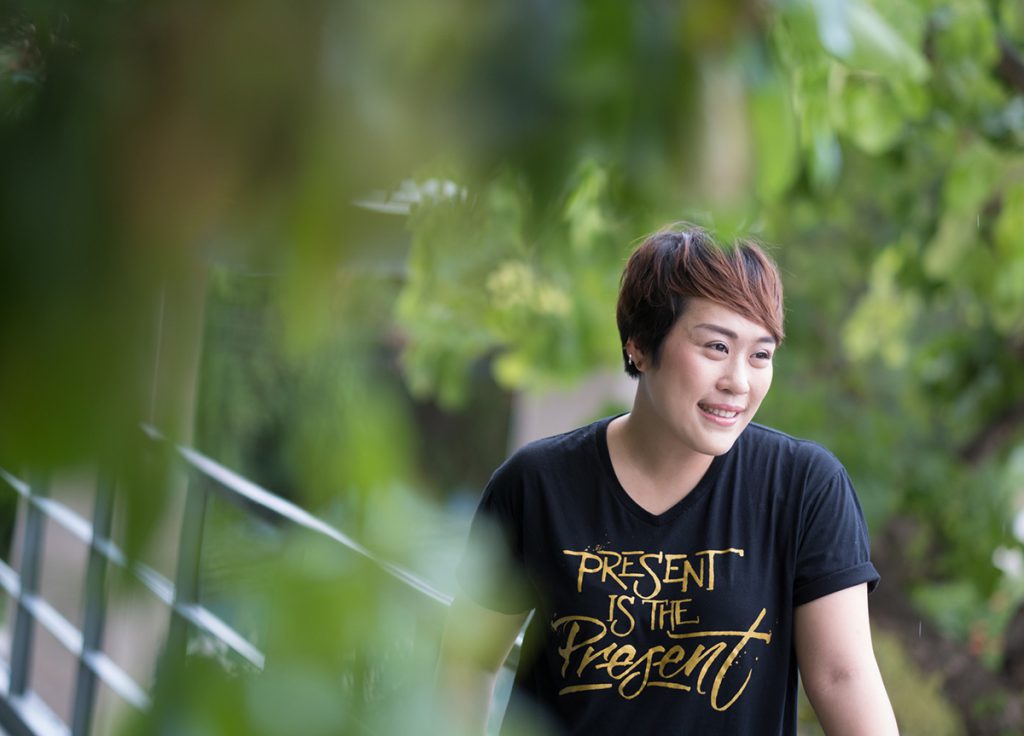
Empathy
Ireal notes that cancer treatment through modern medicine is a lengthy process, and certain kinds of treatment cause the patient physical suffering that has consequences for their professional life, family and in particular, the patient’s spiritual well-being. Some patients become disheartened and withdraw mid-way through treatment, others encounter financial barriers, and others choose alternative forms of treatment. Therefore, providing patients with empathy, encouragement, financial support and the right information is at the heart of Art for Cancer’s activities.
Take, for example, the Survivor Planner, a tool that helps patients look after themselves produced by the Positive Cancer Community and designed by Ireal and other fellow cancer patients — a team that understands what having cancer is like, and what the different stages of treatment are. The planner helps patients keep track of their symptoms, side-effects and other details of the treatment process, such as each round of chemotherapy. The planner was designed, first and foremost, to help patients, but it can also be a valuable record of information for doctors and caregivers too.
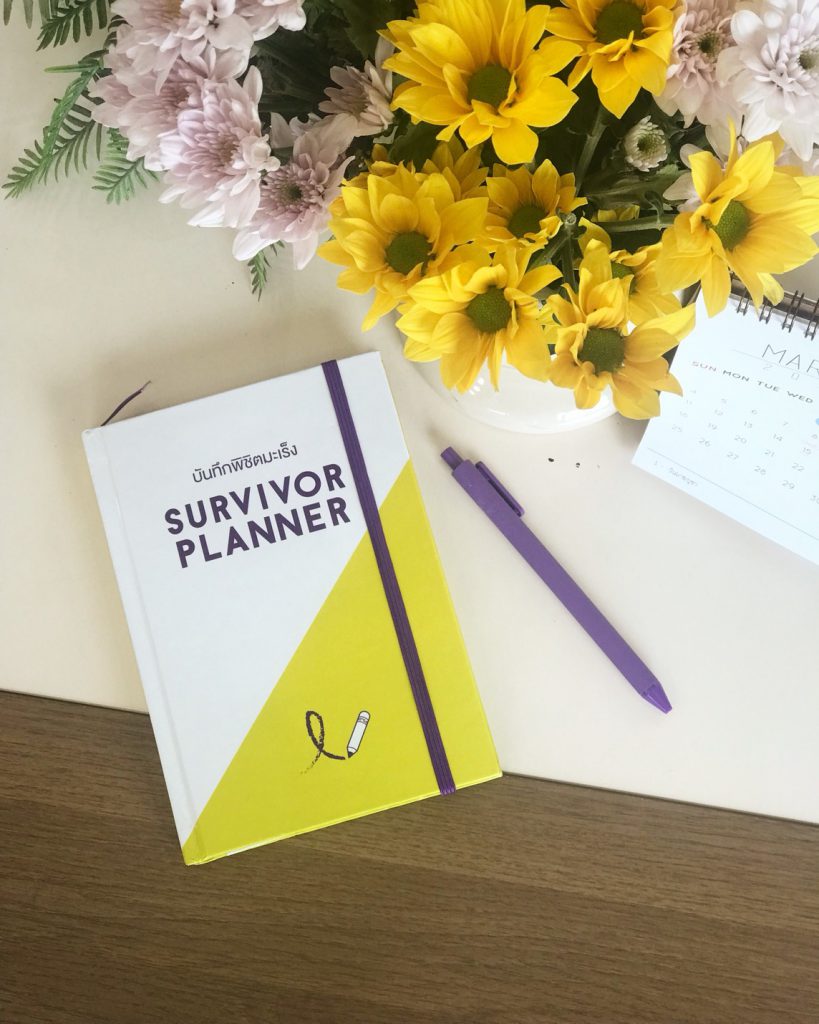
Beautifully designed, the planner is also easy to understand and use. Scattered throughout are inspirational words and phrases and cheerful illustrations, all the product of Ireal’s artistic talents as a graduate of Silpakorn University.
Encouragement
Art therapy is one way of providing a source of encouragement to cancer patients. Ireal holds an art therapy session once a month with art therapists who work with inpatients at Siriraj Hospital. “Art is a medium that helps everyone open up to one another,” Ireal explains. “For example, we can make use of visual media by asking patients to choose an image that best represents them when they introduce themselves. Psychologically, people will choose an image that they relate to or are moved by, which allows them to express themselves and let out what they are feeling inside. To give you an example, we once had a session where someone picked an image of a child holding a basket of flowers, then simply said that they missed their grandchildren because they’ve been here (hospitalized) for a long time, and cried. Therefore, it is important that we create a safe space for them to let go and feel brave enough to express themselves through art”.
In another session, the patients made ‘masks of strength’. It was a simple craft project that conveyed what each patient was feeling through art.
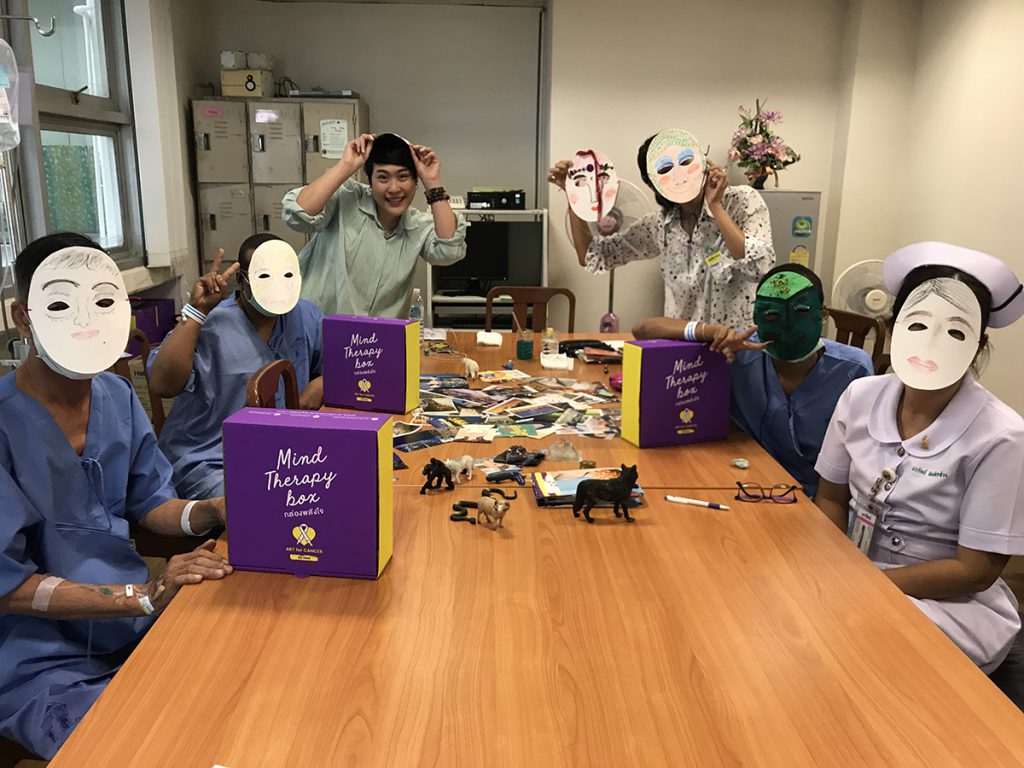
Financial Support
Ireal is well aware of the gaps in a treatment process that she has been through herself. Unlike some other patients, however, she has had access to opportunities and channels that have spared her the worst of it. Although cancer treatment is covered by Thai universal healthcare, certain specific drugs and equipment aren’t. Furthermore, there are other costs that have to be paid out of pocket such as transportation, food, and for patients who need regular radiation and have travelled to the city with their relatives, another challenge is that the relatives may not be able to afford a place to stay during treatment that can last up to a week at a time.
Therefore, Art for Cancer raises funds through the sale of art donated by Ireal’s artist friends. It also organizes other fundraising activities from time to time, such as caricature drawing commissions and sales of notebooks, planners, calendars and tshirts. The funds are deposited at three charities — the Siriraj Foundation, the Ramathibodi Foundation, and the National Cancer Foundation — and then distributed to poor cancer patients, who can use the financial support for costs that are not covered by universal healthcare.
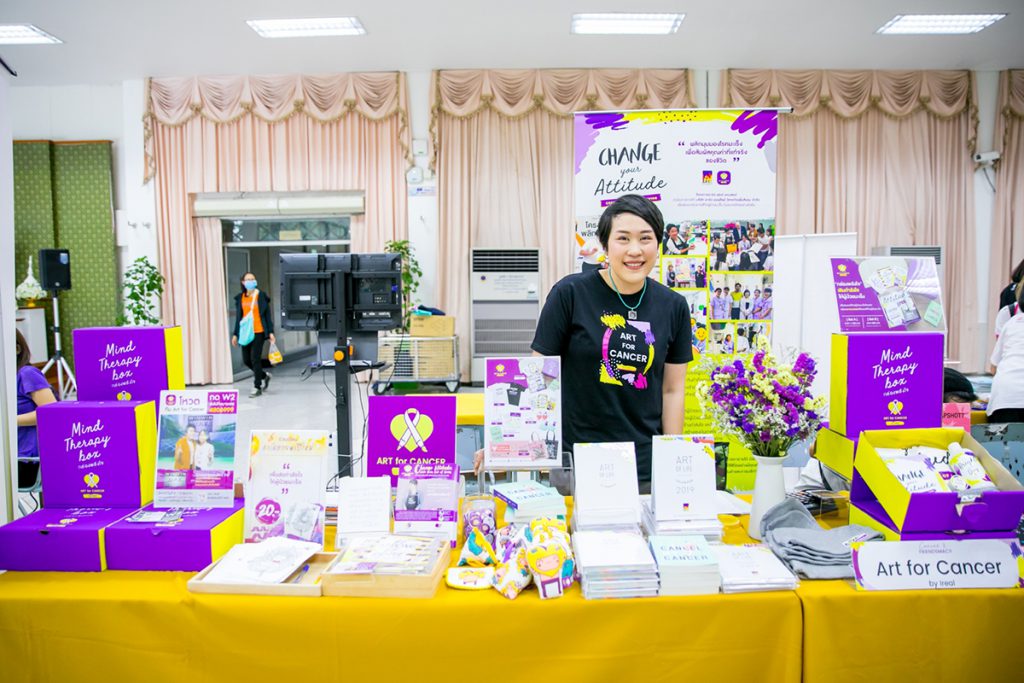
The Right Information
Reflecting on another gap in the healthcare system that she has encountered, Ireal says: “We have to disseminate the right information because they (patients) may only get to talk to a doctor for three minutes. They may already be walking away from the doctor when another question occurs to them. Or, they may encounter a problem but have to wait for another three months before getting to see a doctor, and they don’t know who to go to. When searching Google they can come across all sorts of wrong information. Some patients stop orthodox treatment and turn to local remedies or traditional chinese medicine. I understand why they have to seek alternative treatment because it is a lifeline for them. However we have to find ways of educating them on the fact that orthodox treatment is the established course of treatment, and make sure that they are thoroughly informed. Actually, doctors aren’t against alternative medicine, but I want patients to be equipped with as much correct information on orthodox treatment as possible, or to have access to that knowledge”.
Therefore, in addition to sharing her experiences and disseminating useful information to patients as the facilitator of various activities, Ireal has also created a special space to help patients access the right information for their needs that is based on the concept of a co-caring space
Ireal reflects that “[Patients need] a support group of people who understand them. A space for emotional support that helps them find a way to deal with cancer — how to live with it happily. There needs to be support groups. So, I raised funds to create a space that supports cancer patients that is kind of similar to a co-caring space. There aren’t any of those in Thailand yet, but there are some abroad. Hospitals in Thailand are short on staff; doctors and nurses don’t have the time, so we patients are creating these spaces ourselves to help each other. I want patients to get to meet each other and do activities together”.
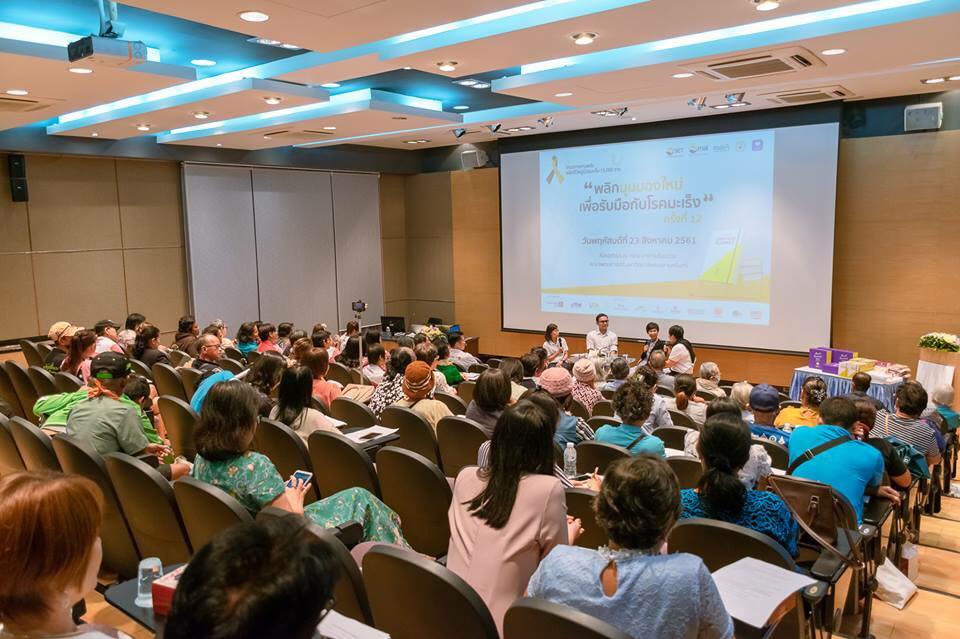
In addition to the virtual “Positive Cancer Community”, which is guided by the principles of a co-caring space, Ireal wants to build a community that gets to meet and talk to each other in-person. She has set herself the goal of organising four such events a year, with the first meeting of the series, “Cancer Friendsmacy” taking place on the 15th of December 2018 in collaboration with the Siriraj Hospital. The event aimed at uplifting participants and giving them space to talk to one another about their experiences with cancer and treatment. There was also an art therapy workshop where participants made watercolor cards and terrariums.
The next year, Ireal wanted to expand the co-caring space to rural areas. She wanted to organise activities and opportunities for cancer patients to meet one another, and consulted with caregivers in every region of the country.
After Art for Cancer’s 6th year anniversary — the same amount of time that Ireal had been living with cancer — and finishing her masters in England, she found that her cancer had not subsided. Instead, her cancer had spread and she was diagnosed with stage 4 cancer. During this time, she also met an important colleague and friend, Sirintip Khatiyakan, who became involved in Ireal’s projects, especially in business-rated matters. That was the beginning of developing Art for Cancer into a social enterprise to improve efficiency and fundraising capacity. Most important to Ireal is sustainability. As she always reminds herself: “I don’t know if I’ll be alive next year. How do I make sure that what I do is sustainable, and won’t die with us”.
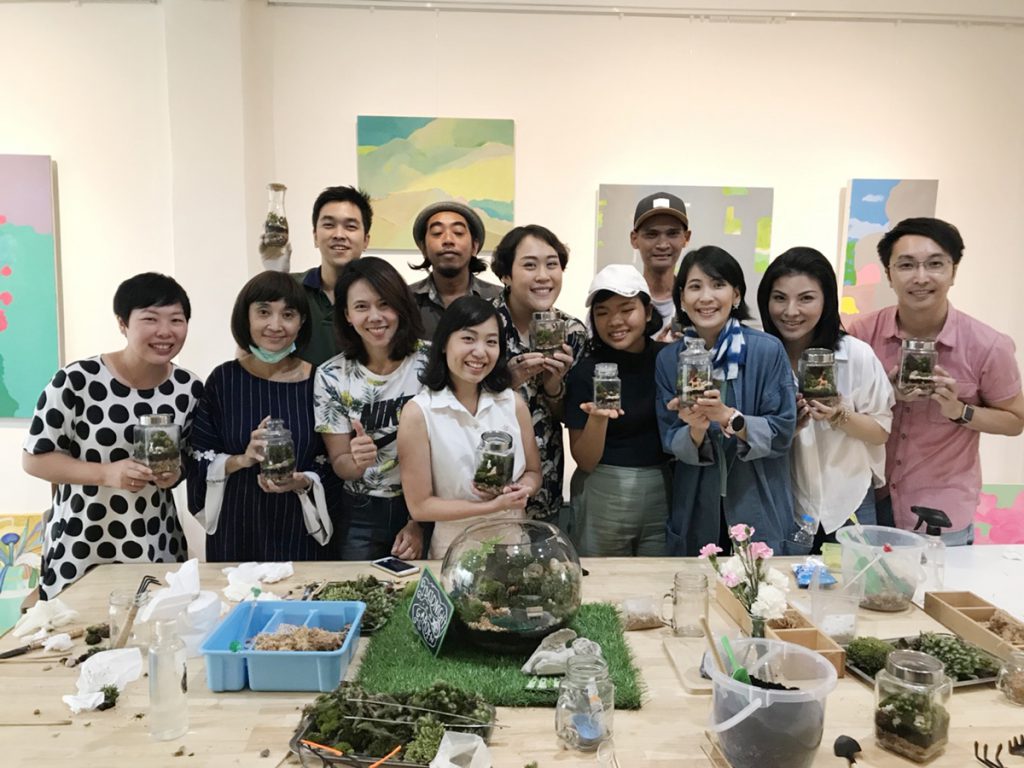
Citations:
Ireal Traisansri, founder of Art for Cancer. Interviewed on 23/11/2018.
Photographs: The Art for Cancer by Ireal facebook page. https://www.facebook.com/artforcancerbyireal/
Important people mentioned: Ireal Traisansri.
